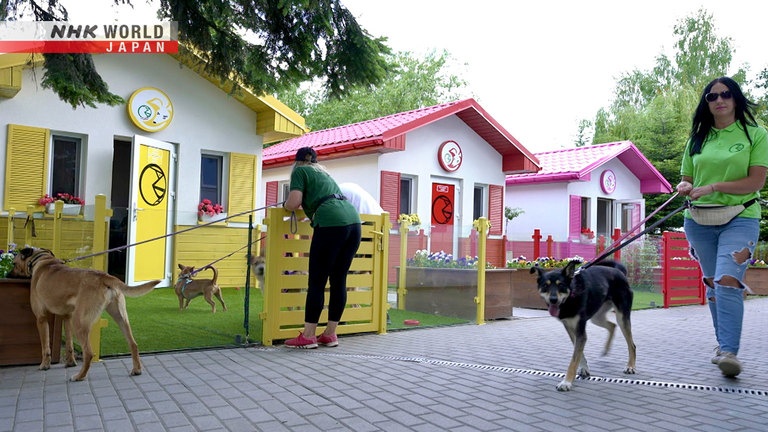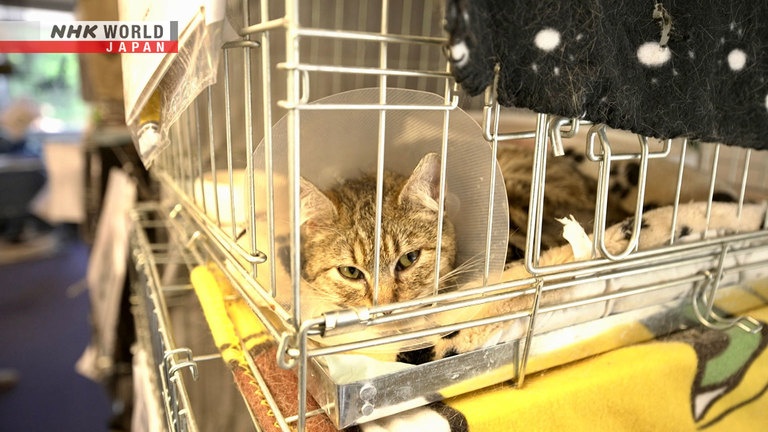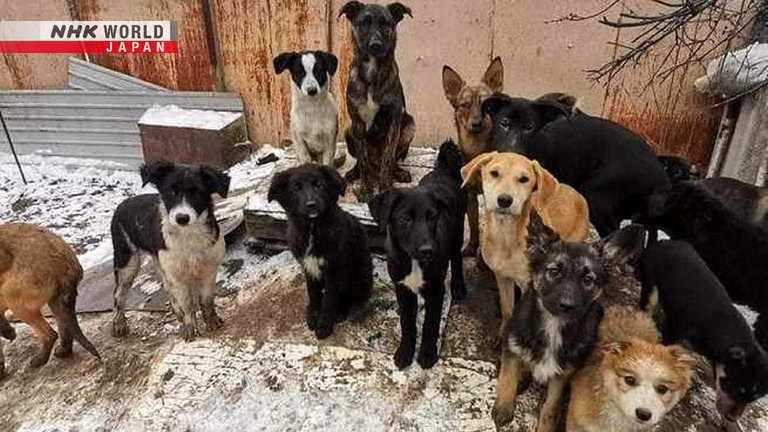Saving Ukraine's Forgotten Animals: Radosław Fedaczyński / Veterinary Surgeon
Polish veterinarian Radosław Fedaczyński is head of an animal shelter that is working to save animals caught up in the horror of the ongoing conflict in Poland's neighbor, Ukraine.



Transcript
Direct Talk
Russia's invasion of Ukraine
has forced millions of Ukrainians
to flee their country.
But humans aren't the only victims
of this tragic conflict.
One individual working to rescue and treat
animals caught up in the hostilities
is Polish veterinarian Radoslaw Fedaczynski.
Radoslaw Fedaczynski
Veterinary Surgeon
He runs this animal shelter
near Poland's southeastern border
with Ukraine.
Here, they take in animals
rescued from Ukraine,
and those left by owners headed for
refugee centers where pets are not allowed.
The conflict has been very hard
on the animals of Ukraine.
We must not lose sight of
humans' responsibility in all this –
whether it's war,
prejudice, whatever,
animals have nothing to do with it.
So we can't turn away from their plight.
This time on Direct Talk,
we speak to a veterinarian striving to save
animals forgotten amid
the ongoing conflict in Ukraine.
Saving Ukraine's Forgotten Animals
Przemysl, Poland
Przemysl is a city in southeast Poland,
close to the border with Ukraine.
It's here that veterinarian
Radoslaw Fedaczynski
leads the ADA Foundation,
which runs an animal shelter
just 10 kilometers from the border.
Originally, the primary focus
of this foundation
was on rescuing and treating wild animals,
but we did also deal with dogs,
cats and other domestic animals
that had been abandoned by their owners.
And through such activities,
we developed an ethos that also saw us
engage actively with helping abused animals.
We take each situation as it comes
and reach out wherever animals are involved.
All animals' lives are of equal value.
The team includes five veterinary surgeons
and 47 support staff,
all funded by donations from supporters
based domestically and overseas.
And it was soon after
the commencement of Russia's invasion
that the group launched
its efforts to save Ukrainian animals.
They began accepting pets free of charge
from evacuees who'd crossed
the border with animals
that couldn't be allowed in refugee centers.
They also began trips across the border
to proactively rescue
stricken creatures for themselves.
With trucks full of pet food
and medical supplies,
they shoulder tremendous risk
by heading into Ukraine
in search of animals in need of rescue.
Those trips from early in the conflict
genuinely put our own lives at risk.
We rescued some dogs from Lviv,
and the very next day
the site was struck by a missile,
causing catastrophic damage.
The deeper we go into Ukraine,
the greater the risk.
For each new arrival,
the team begins with an overall health check.
Okay.
Welcome. Welcome.
It's okay,
don't be scared.
Welcome.
The next step is to deflea them
and administer vaccines for rabies
and other common conditions.
The animals that come across the border
have this look of real fear in their eyes.
Like they don't know
what might happen to them.
In the warzone, they've experienced
bombing and other frightening things.
And many are extremely malnourished,
even the lucky ones
have been fed only bread and water.
Some have been
directly injured in the fighting,
with crushed limbs and hindquarters,
and craniofacial disfigurations.
At first, I was shocked,
and horrified.
Because, far from lone arrivals,
we were getting truckloads of
up to 20 animals at a time.
When we get them into the clinic,
we have to prioritize those
in need of urgent treatment.
Things can get extremely frantic,
but we have to stay calm
and establish who to see first,
who can wait,
who needs surgery,
who needs a transfusion, and so on.
It's really tough –
completely unpredictable,
and mentally and physically exhausting.
No matter how motivated we are,
that alone is not always
enough to see us through.
Including animals brought in by
international pet rescue charities,
the shelter has so far taken
in some 1000 animals from Ukraine,
mostly dogs and cats.
The next challenge is
longer-term care for these patients.
Once back to full health
the dogs are housed in these small cottages.
And to help guard against
loneliness among the animals,
they're also used as offices by ADA staff,
who are able to provide
some much-needed affection.
I've visited a lot of shelters
and animal hospitals,
and most keep the animals in cramped cages.
In the majority of cases,
there's no thought whatsoever given to
animals' happiness and mental wellbeing.
The priority is simply keeping them alive,
and as long as they can manage that,
most places make do with
administering only the most basic care.
With that in mind,
I resolved that
I wanted to do away with such cages.
And in their place,
I came up with the idea of cottages.
In contrast to the cold,
concrete surroundings of a typical shelter,
our aim is a warm, welcoming environment
more akin to a typical family home.
Radoslaw Fedaczynski
was born in Przemysl in 1979.
His father Andrzej was also a veterinarian,
at the local state animal hospital.
I have so many memories of my father's work.
Besides his main position,
he also used to care for farm animals.
Sometimes, we'd even
leave the house at midnight,
and travel to farms in the countryside,
to spend all night tending to cows
through difficult births.
I'd go along to watch,
and I realized what a
wonderful thing he was doing.
I'll never forget the joy
and gratitude on farmers' faces
when he would help a mother cow
bring a new life into the world.
Those experiences gave me a love of animals,
and that led to the work that I do today.
Fedaczynski decided from an early age
that he wanted to follow in those footsteps.
And after graduating from veterinary college,
he began work at a new practice
founded by his father.
Our initial focus was on dogs and cats,
but people began bringing in wild animals.
And word began to spread
that we would care for cases
that other places simply wouldn't handle.
But back then we were just a small practice,
and it became difficult
to keep up on our own.
And covering those
treatment costs out of pocket
put the practice in financial difficulty.
In 2008,
to expand their capacity
to care for wild animals,
Fedaczynski teamed up
with another veterinarian friend
to found the ADA Foundation.
And over the 14 years since,
their support network
has gradually expanded to
bring in donations from all around the world.
At first,
some staff would be scared to work with
types of animals they hadn't treated before.
But it's a belief in the importance
of taking on such challenges
that has brought us this far.
The best feeling in the world is
to bring an animal back to health.
We are constantly progressing,
and for the good of the animals
I want to keep growing.
Caring for animals from Ukraine
has taken the center's outlay
on feed and medicine
to over 200 thousand US dollars a month –
four times their usual budget.
But, thanks to donations
from supporters around the world,
they've managed to keep up
this important work.
I'm so grateful to all the people
who support our activities.
And because our team and
all our supporters are giving so much,
I feel a really strong
sense of responsibility.
Personally,
I wouldn't have been able to accept
simply sending animal feed into Ukraine
and leaving our activities at that.
Thanks to our supporters around the world,
we're planning long term,
and working to implement a system that we can
maintain for two to three years if necessary.
That's all I think about –
I want to keep on supporting
the animals of Ukraine
for just as long as they need our help.
Another crucial task
is finding new homes for animals
who have lost their owners
or have nowhere else to go.
To assess the suitability of potential homes,
ADA asks aspiring adopters
to fill in a 100-point questionnaire.
Next comes a supervised meet-and-greet,
to make sure that potential pairings click.
This dog, Sniezek,
came in from Ukraine three months ago.
Having found a new family in Poland,
today is the big day of his adoption.
Look! Who's this?
Hello there, sweetheart.
You're such a big, chilled boy.
Your new sibling at home
is a bit of a wild one!
He's trying to show his good side,
but he'll liven up when you get home.
Are you going to be a cheeky boy?
Four months into the conflict,
the center had already managed to rehome
70 dogs and 15 cats from Ukraine.
But as hostilities rumble on,
ADA expects to take in many more animals
from Poland's war-torn neighbor.
This terrified little dog who has lost
his leg is just the tip of the iceberg.
It pains me to think of the thousands
more animals in just the same situation.
While we are caring for these patients,
many more animals are dying in Ukraine.
I got one message from an owner
who said their dog was stranded
in an apartment under bombardment,
asking us to help.
But we can't go to such dangerous places.
If a member of staff, or someone we hired
was to go there and lose their life,
I'd never forgive myself.
It's a painful, complex situation –
and we don't even know
if the information was up to date.
Perhaps the apartment where the dog was left
had already been destroyed –
we just don't know.
But it pains me that
we can't respond to such requests.
Do you have any words to live by?
Love is the key.
If there was love,
this war would never have started.
And love is the reason that people in Poland
are reaching out to
help our Ukrainian neighbors.
But first of all, we need to speak
to others with love in our hearts
and try to understand one another.
If we did that,
war would end around the world.
Even serious differences
can be solved through discussion,
and that could end such misery
for so many people and animals.
Just knowing that can
change your own perspective.
And passing that understanding
on to those around you
could change the whole world.